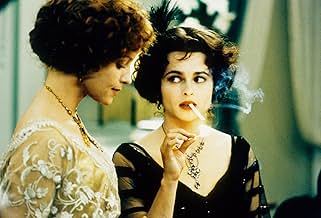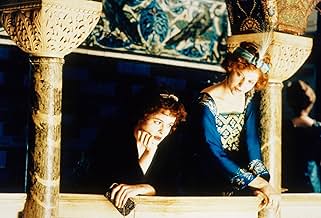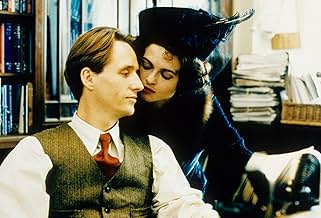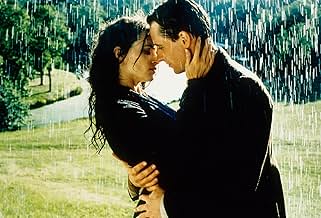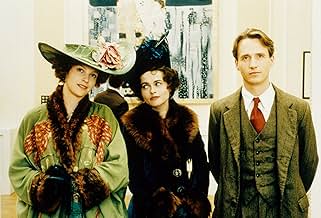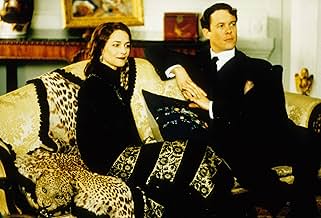Adicionar um enredo no seu idiomaAn impoverished woman who has been forced to choose between a privileged life with her wealthy aunt and her journalist lover, befriends an American heiress. When she discovers the heiress is... Ler tudoAn impoverished woman who has been forced to choose between a privileged life with her wealthy aunt and her journalist lover, befriends an American heiress. When she discovers the heiress is attracted to her own lover and is dying, she sees a chance to have both the privileged li... Ler tudoAn impoverished woman who has been forced to choose between a privileged life with her wealthy aunt and her journalist lover, befriends an American heiress. When she discovers the heiress is attracted to her own lover and is dying, she sees a chance to have both the privileged life she cannot give up and the lover she cannot live without.
- Direção
- Roteiristas
- Artistas
- Indicado a 4 Oscars
- 16 vitórias e 32 indicações no total
- Royal Bodyguard
- (não creditado)
- Man in Boat Queue
- (não creditado)
- Carriage Driver
- (não creditado)
- Man in Bookshop
- (não creditado)
- Direção
- Roteiristas
- Elenco e equipe completos
- Produção, bilheteria e muito mais no IMDbPro
Avaliações em destaque
Yes, this is a quite, indirect, thoughtful movie. But it is never slow. And the acting is incredible, almost as incredible as all the dresses and interior sets, which will blow anyone's mind. The story, by Henry James (the master of indirect but probing feelings), is about love of all kinds. And about being a good person, really. Three of the four main leads struggle with doing the right thing (and they do the right thing). The fourth struggles, falters, then comes forward again, then falters, finally, by making a demand that can never be met.
It's unfair to compare this kind of period movie (set around 1910 even though James's book was published in 1902) to "A Room with a View" (set in the same decade) but the reason this happens is that the 1985 Merchant-Ivory masterpiece seemed to open up a new way of making period films, filled with beauty and lingering thoughts and, well, feeling. Not the feeling two people have for each other, but a feeling of a time and place. It so happens the star of this 1997 film, Helena Bonham Carter, also starred (magnificently) in the first one.
The other star is a man, Linus Roache, who almost overplays his understated character by making him dry and deadpan and polite. But it works, over time, to help make the final few seconds of the film (which are so important) succeed. The third lead, really, in this lopsided triangle, is Alison Elliott, who puts in an equally subtle performance. So much of the movie is about little changes in facial expression, the acting had to rise to the needs of the plot. Bonham Carter, above all, does this with chilling perfection.
But those dresses! This is what is called Edwardian England, the first decade of the 20th Century, a time when modernity swept Europe with a passion (Picasso and Klimt) and when cars and other new technologies were surging. The styles of the dresses are part Art Nouveau, with its Asian influences, and part European excess, a showing off of style and wealth and material sensibility. Thank god! It's just breathtaking. The interiors are likewise brimming with tiles and flowers and paintings and light of all kinds.
All of this is handled with a cinematic control that reminds me of the color coordination of mid-century Technicolor films, where the palette of a scene is often limited to a pair of colors. You'll see many scenes where a mix of blue and rusty orange are the only two colors in various guises (and these are most common because of the hair and eyes of Elliott). The cinematography is by Eduardo Serra, one of a handful of the most sumptuous contemporary shooters in film ("Girl with the Pearl Earring" and "What Dreams May Come"). And he lets the light and color inhabit every scene, never letting the photography get in the way. Just beautiful.
So what does it mean to be a good person? Who cares with all this great acting and beautiful filming? But really, you do care, and it's a touching and provoking film in all its quietness. And it's not a bit obscure. Henry James never quite liked the book, but I think it's because he expected more from it, the themes and characters are so promising. Critics have come to see it as one of his great late novels, and that much is here. Director Iain Softley takes a couple of turns that the book avoids--a little sensational talk toward the beginning, and a frank and sex scene at the end--and both are okay in the film but not actually in keeping with the tone of the rest of it, which is about never quite showing your hand even to your closest friends. It's about waiting to speak, and hiding even good intentions for fear of seeming good when in fact part of being good is simply being good, not merely seeming it.
It is hard to decide where to begin praising The Wings of the Dove, but a definite starting point would be the production values. Simply put, The Wings of the Dove is not only one of the most visually stunning films personally seen in recent memory but also one of the most beautiful ever, strongly reminiscent of a Merchant-Ivory film. It's exquisitely shot, especially in the Venetian scenes and the final scene between Millie and Merton, the settings and period detail are so colourful and evocative and The Wings of the Dove has to contain some of the best and jaw-droppingly amazing costume design in all of film. The sensitive and beautifully elegant music score and rightly restrained direction also add a great deal.
Hossein Amini received an Oscar nomination for the film's script, and it is not hard to see why. It is a literate, deliciously dark and beautifully nuanced script that is never devoid of emotion, and adapts very difficult source material remarkably cleverly and with utmost coherence. The story is deliberate in pace, but dark and poignant- the latter scenes being incredibly powerful emotionally- and it is throughout told with complete control and respect for James' work. It also succeeds brilliantly as a mood piece, the darkness, poignancy and lyricism very well brought out. The characters also fascinate, compellingly real and human rather than labelled just good and bad.
The Wings of the Dove contains fine performances, with that of Helena Bonham Carter ranking among the year's and her best, her character makes some questionable decisions to put it lightly but the many nuances Bonham Carter brings to the role allows one to really sympathise with her and understand why she makes them. Allison Elliot was also charming and heart-breaking in a role that easily could have been played annoyingly or blandly in lesser hands, and Linus Roache handles the hardest role of the whole film and story very, very well. Charlotte Rampling, Michael Gambon, Elizabeth McGovern and Alex Jennings are all talented actors too and give excellent support.
All in all, wonderful film and one of the best Henry James film adaptations ever made. 10/10 Bethany Cox
First, it must plant some images permanently in your life. Very few films do that. Two films that are cogent to discussing this one are Helena Bonham Carter's Ophelia in Zefferelli's `Hamlet.' She and Glenn Close acted circles around the guys -- her expression in the midst of the play within the play is lasting over years in my memory. The whole film revolves around that moment.
Also lasting are several images from the ostensibly unambitious `Oscar and Lucinda.' But I also carry many lasting film images that are junk, courtesy of Lucas and Spielberg. That brings us to the second condition: for a film to be classic, evocation of the images, the remembrance, needs to be multidimensional, to elevate rather than dumb down.
Measured by those rules, this film is remarkable. For a few years, I have carried the image of the next to last scene where Carter makes love and in the act discovers the truth about her love. This is so wonderful, so tragic, so true that it has stuck with me, together with the secondary images, the memories of Venice and Millie that Merton is in love with. I hope to follow this woman's career for decades. I wonder where it will go?
I've not read the book on which this film is based so can't say how they compare; but as a work in its own right I really enjoyed it. The romance feels real, with Kate clearly knowing she is taking a risk... both that her aunt will disinherit her for seeing Merton and that he might genuinely fall for Milly. The setting is beautifully realised but never feels dated... which it shouldn't as whatever present one is in feels modern for those people in it. Helena Bonham Carter does a brilliant job in the role of Kate; she shows what Kate is feeling with the subtlest of expressions; she also makes it easy to sympathise with Kate even while she is being morally ambiguous. Linus Roache and Alison Elliott impress as Merton and Milly respectively and the rest of the cast is solid. The film looks great from start to finish as it moves from London to Venice. Overall I'd definitely recommend this to fans of period dramas.
Você sabia?
- CuriosidadesThe original Milly was a tribute to Henry James' niece Minny, who died of tuberculosis.
- Erros de gravaçãoThe tile pattern on the Underground stations the train passes through at the beginning of the film are identical in pattern and color for each station. Each station on the Piccadilly line had its own tile pattern and color scheme so that the illiterate could still recognize their station without needing to read the station name.
- ConexõesFeatured in Venice Report (1997)
Principais escolhas
- How long is The Wings of the Dove?Fornecido pela Alexa
Detalhes
- Data de lançamento
- Países de origem
- Central de atendimento oficial
- Idioma
- Também conhecido como
- The Wings of the Dove
- Locações de filme
- 10 Carlton House Terrace, St. James's, Londres, Inglaterra, Reino Unido(Aunt Maud's house, interior and exterior)
- Empresas de produção
- Consulte mais créditos da empresa na IMDbPro
Bilheteria
- Faturamento bruto nos EUA e Canadá
- US$ 13.692.848
- Fim de semana de estreia nos EUA e Canadá
- US$ 183.610
- 9 de nov. de 1997
- Faturamento bruto mundial
- US$ 13.692.848
- Tempo de duração
- 1 h 42 min(102 min)
- Mixagem de som
- Proporção
- 2.35 : 1


